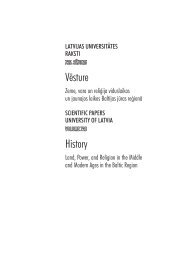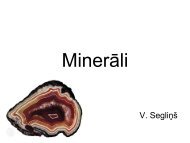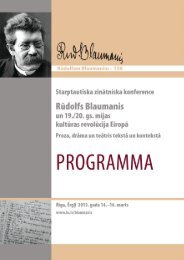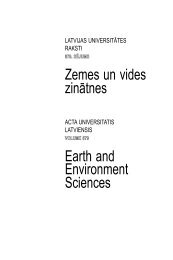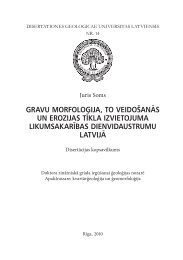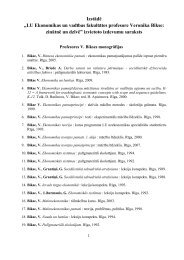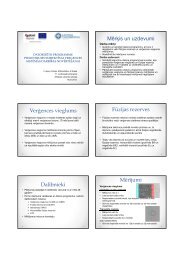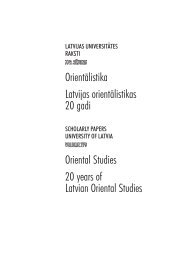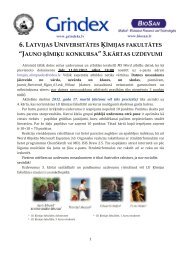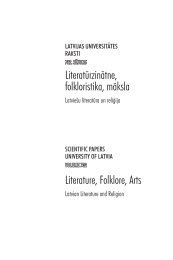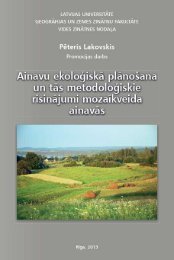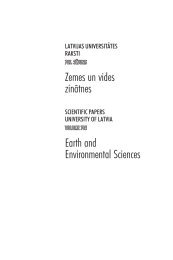Latgalistikys kongresu materiali, III. 2011. - Latvijas Universitāte
Latgalistikys kongresu materiali, III. 2011. - Latvijas Universitāte
Latgalistikys kongresu materiali, III. 2011. - Latvijas Universitāte
Create successful ePaper yourself
Turn your PDF publications into a flip-book with our unique Google optimized e-Paper software.
there are 12 different variants of the dialect. Acknowledgment of only one<br />
of them could thus make the others disappear, while a kind of “common<br />
Övdalian” would be no one’s mother tongue. Another fact that speaks<br />
against Övdalian’s recognition is the fear that such a change could divide<br />
the municipality which is inhabited by Övdalians, Sami-people and people<br />
speaking Norwegian dialects.<br />
When deciding whether a language variety should be raised to the<br />
status of a minority language the question appears where the borderline<br />
between a dialect and a language is. In the case of Övdalian one would<br />
have to decide whether other unique dialects as e.g. vernaculars from<br />
Mora, Orsa or Överkalix should also receive the status of a language, yet<br />
the decision is not based on purely linguistic criteria, which makes it so<br />
intricate. Moreover, the opponents of Övdalian’s recognition express<br />
doubts whether teaching materials have to be translated into minority languages<br />
and whether authorities should provide translators and interpretters<br />
as it is stated in the Charter (see Josephson 2007; Reinhammar 2007).<br />
The adherents of raising Övdalian’s status stress that the Charter offers<br />
a list with proposals out of which the state can choose those that satisfy<br />
requirements of the language and therefore it can be applied very individually.<br />
As a response to the previously cited doubts, Övdalian’s enthusiasts<br />
claim that there is no need for using Övdalian in contact with authorities<br />
today as all Övdalian-speaking people are fluent in Swedish as well.<br />
Therefore Övdalian’s acknowledgment first and foremost is going to support<br />
its introduction at schools so that children with Övdalian as a mother<br />
tongue are not going to forget their language and that the right to preserve<br />
one’s mother tongue is safeguarded. Schools and teaching materials do not<br />
have to be monolingual (in Övdalian) since the knowledge of Swedish is<br />
equally important. Another point in favour of Övdalian’s recognition is the<br />
new standardised orthography, which has proved that the dialect has already<br />
a written variety. Finally its acknowledgement is going to help to<br />
develop the dialect, to raise its status and to get financial support for cultural<br />
activities and education.<br />
As it can be observed, the main dilemma is maybe not whether<br />
Övdalian is a language or a dialect, but what benefits are associated with<br />
its recognition as a minority or regional language according to the Charter<br />
and how such recognition can help to save threatened linguistic varieties.<br />
If by raising Övdalian’s status, the variety can be offered protection and<br />
160



